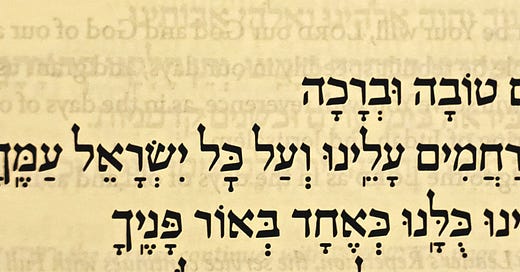This week's Torah content has been sponsored by my friend and colleague, Rabbi Dr. Elie Feder. Rabbi Feder recently published a book called Gematria Refigured: A New Look at How the Torah Conveys Ideas Through Numbers (2022, Mosaica Press). The approach to gematria he presents in this book is neither fluffy nor fanciful, but rational. If you're interested in some sample chapters, click here. If you have a social media platform and are interested in promoting or reviewing Rabbi Feder's book, let me know and I'll put the two of you in touch. The book is available for purchase at Mosaica Press.
Click here for a printer-friendly 1-page version of this article, and click here for the podcast version.
Beur Tefilah: Who is the “Aleinu” in Sim Shalom?
Sim Shalom, the final berachah of the amidah, opens with the sentence: “Establish peace, goodness and blessing, favor and kindness and mercy aleinu (upon us) ve’al kol Yisarel amecha (and upon all Israel, Your people).” The question is: to whom does “aleinu” refer? Ordinarily we might read this word as a collective reference to the Jewish people, but if that were the case here, the next phrase, “ve’al kol Yisarel amecha,” would be redundant.
It is tempting to answer that “aleinu” refers to the congregation or group of people with whom one is davening. However, R’ Yitzchak Eliyahu Landau (in his Siddur Dober Shalom commentary, published in Siddur Otzar ha’Tefilos) rejects this interpretation, arguing that an individual davening alone ought to then change the word from aleinu (upon us) to alai (upon me). He answers that since peace requires harmony between at least two parties, we ask Hashem to establish peace aleinu, “between me and that which opposes me,” whatever that opposition may be.
I, on the other hand, prefer to answer that “aleinu” refers to mankind as a whole. We ask Hashem to “establish peace upon us [human beings in general,] and upon all Israel, Your people, [in specific].” This accords with the position of R’ Chanina, deputy of the kohanim, who said: “daven for the peace of the government, because were it not for people’s fear of it, each man would swallow his fellow alive” (Avos 3:2). Rabbeinu Yonah there (ibid.) writes:
This means to say that a person should daven for the peace of the entire world and feel pain over the pain of others. Such is the way of the tzadikim, as David said: “But as for me, when they (i.e. my enemies and oppressors) were ill, my clothing was sackcloth, and I afflicted myself with fasting; may my prayer return upon my own bosom” (Tehilim 35:13), for a person should not make his supplications and requests for his own needs alone, but should daven that all humanity should be in a state of peace. And with the peace of the government, there will be peace for the world.
Rav Hirsch endorses this approach in his commentary on the next sentence in Sim Shalom: “Bless us, our Father, all as one with the light of Your countenance, for through the light of Your countenance you have given us, etc.:”
Once this light will enlighten us all equally, once we will all be of one mind in the recognition of God and of what is pleasing in His sight, then the peaceful harmony of life will be a natural outgrowth of this unity of conviction and endeavor. For through this enlightenment all of us are given the Divine Law of life to aid us in the acquisition of understanding, the love of selfless devotion to shape our conviction, and loyalty to duty as the character trait to motivate our conduct. In this manner blessing, compassion, life and peace will come to all men.
Ralbag (Bereishis 1:3; Bamidbar 6:25; Mishlei 16:15) maintains that “light of Your countenance” means knowledge. Rambam (Moreh 3:11) explains that since all interpersonal conflicts are caused by ignorance, therefore, peace can only come about through knowledge, and this will be the cause of world peace at the time of Moshiach:
Just as a blind man, because of absence of sight, does not cease stumbling, being wounded, and wounding others, because he has nobody to guide him on his way, so too, the various sects of men – each according to the extent of his ignorance – does to himself and to others great evils from which individuals of the species suffer. If there were knowledge, whose relation to the human form is like that of the faculty of sight to the eye, they would refrain from doing any harm to themselves and to others. For the knowledge of truth removes hatred and quarrels, and prevents mutual harms … The prophet points out what will be the cause of this change [in the Messianic era], for he says that hatred, quarrel, and fighting will come to an end, because men will then have a true knowledge of God. “They will neither injure nor destroy in all of My holy mountain; for the earth will be as filled with knowledge of Hashem as water covers the seabed” (Yeshayahu 11:9).
This interpretation of Sim Shalom flows from the penultimate statement in the previous berachah of Modim: “and all living beings will thank You, Selah, and they will praise Your Name in truth.” That is, when all human beings thank and praise Hashem, then He will establish peace upon all mankind, and will bless His people Israel with peace.





Nice Pshat. Al derech drush, I wonder if you could interpret "alenu" as a reference to the parts of the soul/psyche/self. Seeking harmony in ones internal world, which exists as a derech nistar correlate/cause to the quest for shalom in the outside world.